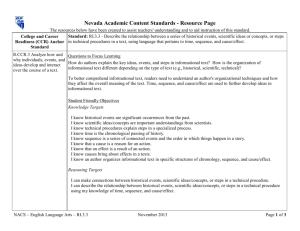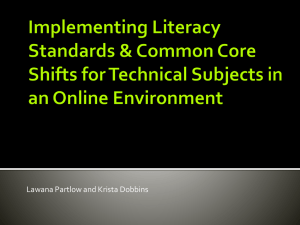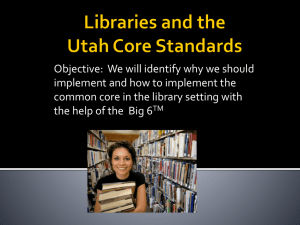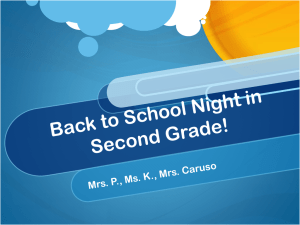6 th Grade English/Language Arts Syllabus 2014-2015
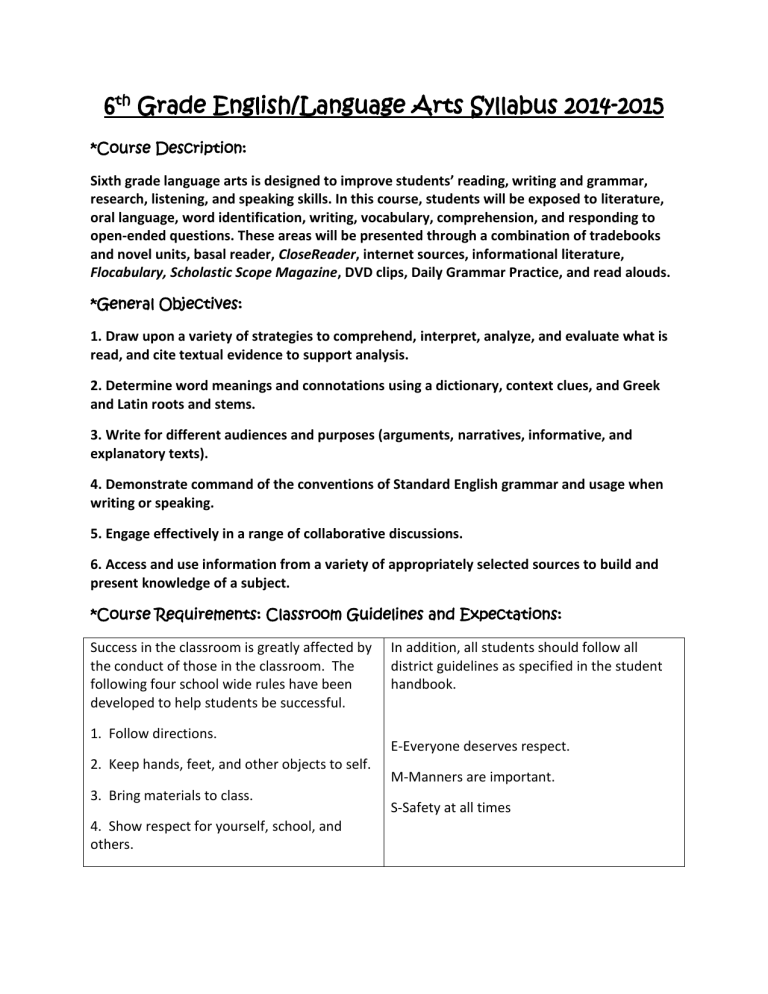
6
th
Grade English/Language Arts Syllabus 2014-2015
*Course Description:
Sixth grade language arts is designed to improve students’ reading, writing and grammar, research, listening, and speaking skills. In this course, students will be exposed to literature, oral language, word identification, writing, vocabulary, comprehension, and responding to open-ended questions. These areas will be presented through a combination of tradebooks and novel units, basal reader, CloseReader, internet sources, informational literature,
Flocabulary, Scholastic Scope Magazine, DVD clips, Daily Grammar Practice, and read alouds.
*General Objectives:
1. Draw upon a variety of strategies to comprehend, interpret, analyze, and evaluate what is read, and cite textual evidence to support analysis.
2. Determine word meanings and connotations using a dictionary, context clues, and Greek and Latin roots and stems.
3. Write for different audiences and purposes (arguments, narratives, informative, and explanatory texts).
4. Demonstrate command of the conventions of Standard English grammar and usage when writing or speaking.
5. Engage effectively in a range of collaborative discussions.
6. Access and use information from a variety of appropriately selected sources to build and present knowledge of a subject.
*Course Requirements: Classroom Guidelines and Expectations:
Success in the classroom is greatly affected by the conduct of those in the classroom. The following four school wide rules have been developed to help students be successful.
In addition, all students should follow all district guidelines as specified in the student handbook.
1. Follow directions.
2. Keep hands, feet, and other objects to self.
M-Manners are important.
3. Bring materials to class.
E-Everyone deserves respect.
S-Safety at all times
4. Show respect for yourself, school, and others.
Materials
3-Ring Binder
Loose-leaf Paper
Pencils
Highlighters
Colored Pencils
Pocket Folders
Dividers
Composition
Book
Grades Homework Grading Scale Projects
Graded assignments include:
Tests
Quizzes
Homework
Projects
Research Papers
Essays
3-4 times a week
5-30 minutes
93 – 100 A
85 – 92 B
Study for quizzes and tests.
77 – 84 C
70 – 76 D
0 – 69 F
Weighted Scale:
Projects count 3 times.
Tests count 3 times.
Quizzes count twice.
Research
Book Projects
Essays
Homework counts once.
*
Tentative Course Outline:
1 st Quarter
August/September (UNIT 1)
-Read Aloud: Genre - Mystery
-Novel Study: Peak
-Common Reading and Writing Activities through Scholastic Scope Magazine
-Flocabulary/Vocabulary Activities
-Short Stories from Literature Book
-Nonfiction/Informational Literature
-Drama
-Introduce Narrative, Argumentative, Explanatory, and Informative Writing
Specific Skills and Standards:
Analyze different genres of literature and their elements.
Draw conclusions and make inferences.
Interpret figurative language.
Compare/contrast main ideas across literary texts.
Analyze works of fiction and nonfiction.
Understand the characteristics of drama.
Demonstrate the use of prewriting techniques (introduction, body, and conclusion).
Compose multiple-paragraph compositions.
Demonstrate command of the conventions of Standard English grammar and usage when writing or speaking.
Spell correctly.
Determine word meaning including multiple meaning words.
October (Cont.UNIT 1)
-Novel Study: Peak
-Story telling and speaking DVD w/ Jackie Torrence
- Short stories from literature book, Scary Stories to Tell in the Dark
-Scholastic Scope grammar and reading activities w/ CCSS and Cross Curricular Connections
- Informational Literature
-Research and brochure creation related to Red Ribbon Week
-Community service project for Hospice Care of the Piedmont w/ letter writing activity
-Flocabulary
- Narrative, Argumentative, Explanatory, and Informative Writing
Specific Skills and Standards:
Analyze different genres and their elements.
Cite textual evidence to support analysis.
Compare and contrast reading, hearing, and viewing different genres of literature.
Draw conclusions and make inferences.
Determine point of view and its effect on text.
Interpret figurative language.
Determine word meaning through use of reference sources, context clues, and structural analysis.
Create multiple-paragraph compositions using organizational skills and effective transitional words and phrases.
Demonstrate command of the conventions of standard English grammar and usage when writing or speaking.
Carry out and present research.
Spell correctly.
2 nd Quarter
November (UNIT 2):
-Novel: Lottery Rose
-Excerpts from Tom Sawyer w/drama activity from Scope
- Short stories
-Nonfiction articles and literature
-American Traditions Internet reading, writing, and research (Thanksgiving)
- Narrative, Argumentative, Explanatory, and Informative Writing
- Scholastic Scope
- Flocabulary
Specific Skills and Standards:
Draw conclusions and make inferences.
Analyze works of fiction and nonfiction.
Analyze informational texts to draw conclusions and make inferences.
Respond to informational texts.
Compose multiple-paragraph compositions.
Demonstrate command of the conventions of Standard English grammar and usage when writing or speaking.
Spell correctly.
Interpret idioms.
Interpret figurative language.
December (UNIT 2 cont.)
-Novel: Lottery Rose
- Short stories from literature book
- Informational literature
- Informational and Explanatory Writing
-Reading and research comparing American holidays w/ those in other countries
Specific Skills and Standards:
Response to literary texts through collaborative discussion and writing
Analyze story elements.
Draw conclusions and make inferences.
Read independently to gain knowledge.
Determine and discuss cause-and-effect relationships in a variety of texts.
Interpret figurative language.
Spell correctly.
Demonstrate command of the conventions of standard English grammar and usage when writing or speaking.
Compose multiple-paragraph compositions.
3 rd Quarter
January (Unit 3)
-Short Stories from literature book as related to unit
-Cold Reads
-Poetry
-Flocabulary
-Scope Magazine
-Informational Literature
-Practice writing types as needed w/ special emphasis on argumentative
Specific Skills and Standards:
Interpret and discuss story structure elements.
Compare and contrast pieces of literature.
Draw conclusions and make inferences.
Compose multiple-paragraph compositions using with effective introduction, body, and conclusion.
Spell correctly.
Demonstrate command of the conventions of standard English grammar and usage when writing or speaking.
February (Unit 3 cont.)
Specific Skills and Standards:
-Short stories from literature book as related to unit
-Cold Reads
-Poetry
-Flocabulary
-Scope Magazine
-Informational Literature
-Practice writing types as needed w/ special emphasis on argumentative
Interpret figurative language.
Draw conclusions and make inferences from informational texts.
Analyze central ideas in informational texts.
Respond to informational texts.
Interpret informational texts.
Interpret text elements.
Interpret functional text features.
Analyze cause and effect in informational texts.
Identify propaganda techniques.
Determine denotation and connotation of words.
Create informational pieces.
Spell correctly.
Demonstrate command of the conventions of standard English grammar and usage when writing or speaking.
March (Unit 4 and 5)
-Read Aloud: Iditarod: The Greatest Win Ever and / or Diamond Willow
-Iditarod reading, writing, and research
-DVD Clips related to Iditarod research
-Newspapers, informational, and fictional texts
-Reader's Theater (Drama)
-Poetry
-Flocabulary
-Scope
-Informational and argumentative writing
-Introduce novel: Night of the Twisters
Specific Skills and Standards:
Analyze story elements and the effects of author's craft on texts.
Draw conclusions and make inferences of informational texts.
Analyze central ideas of informational texts.
Respond in writing and effective discussion to informational texts.
Interpret informational texts.
Interpret text elements.
Interpret functional text features.
Analyze cause and effect relationships in a variety of texts.
Identify and explain the use and purpose propaganda techniques.
Determine denotation and connotation of words.
Spell correctly and use correct grammar conventions.
Make and read charts, graphs, and maps.
Choose appropriate research sources.
Cite evidence from text to support an argument.
Choose language that expresses ideas precisely and concisely.
4 th Quarter
April (UNIT 5 cont.)
-Read Aloud: Night of the Twisters
-Related Informational Texts
-Scope
-Flocabulary
-Research and citation
-Folktales: fables, fairy tales, myths, and other
-Poetry
-Short stories
Specific Skills and Standards:
Draw conclusions and make inferences.
Identify and discuss effects of author’s bias.
Identify and interpret idioms and euphemisms.
Clarify and refine a research topic.
Paraphrase and summarize.
Create a list of sources using MLA format.
Determine meaning and use new vocabulary effectively in speaking and writing.
Determine and use effective organizational strategies for written works and oral presentations.
Choose and use appropriate graphics to support written works and oral presentations.
Use print and electronic resources.
Design a research project.
Demonstrate command of the conventions of Standard English grammar and usage when writing or speaking.
Read, comprehend, and compare poetic literature.
May (Unit 5 & 6)
-Novel: Night of the Twisters
-Short Stories from literature book
-Poetry
-Writing poetry (Poetry Book)
-PASS/ CCSS review of 6th grade standards
-State Testing
Specific Skills and Standards:
Use MAP data and other information to review standards for PASS.
After PASS, work on a poetry project.

